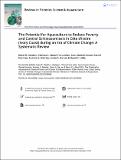Files in this item
The potential for aquaculture to reduce poverty and control schistosomiasis in Côte d’Ivoire (Ivory Coast) during an era of climate change : a systematic review
Item metadata
| dc.contributor.author | Ozretich, Reed W. | |
| dc.contributor.author | Wood, Chelsea L. | |
| dc.contributor.author | Allan, Fiona | |
| dc.contributor.author | Koumi, Ahou Rachel | |
| dc.contributor.author | Norman, Rachel | |
| dc.contributor.author | Brierley, Andrew S. | |
| dc.contributor.author | De Leo, Giulio A. | |
| dc.contributor.author | Little, David C. | |
| dc.date.accessioned | 2022-03-15T16:30:01Z | |
| dc.date.available | 2022-03-15T16:30:01Z | |
| dc.date.issued | 2022-02-21 | |
| dc.identifier | 278181404 | |
| dc.identifier | 89f1ddad-2a1a-45d4-adcc-d1b5526cc53a | |
| dc.identifier | 000758626000001 | |
| dc.identifier | 85125382762 | |
| dc.identifier.citation | Ozretich , R W , Wood , C L , Allan , F , Koumi , A R , Norman , R , Brierley , A S , De Leo , G A & Little , D C 2022 , ' The potential for aquaculture to reduce poverty and control schistosomiasis in Côte d’Ivoire (Ivory Coast) during an era of climate change : a systematic review ' , Reviews in Fisheries Science & Acquaculture , vol. Latest Articles , pp. 1-31 . https://doi.org/10.1080/23308249.2022.2039096 | en |
| dc.identifier.issn | 2330-8249 | |
| dc.identifier.other | Jisc: 125228 | |
| dc.identifier.uri | https://hdl.handle.net/10023/25052 | |
| dc.description | This work was supported by the Natural Environment Research Council (NERC) via the Belmont Forum: Climate and Health under grant # NE/T013710/1. CLW and GADL were partially supported by US National Science Foundation (NSF) project ICER-2024383. GADL was also partially supported by NSF DEB—2011179. | en |
| dc.description.abstract | The development of water management infrastructures, such as dams and canals, are important components of society’s response to feed a growing human population and to fight climate change. Yet, these changes in land use can also increase the transmission risk for waterborne diseases. Transmission risk associated with artificial reservoirs has been extensively documented for schistosomiasis, a parasitic disease of poverty that infects more than 240 million people worldwide. Over 90% of these cases are in sub-Saharan Africa, a region that is being steadily reshaped by climate change. Controlling the parasite’s obligate intermediate host snail is key to reducing transmission of this disease. Using commercial aquaculture to farm marketable species which predate upon these snails in vulnerable regions can have multiple positive effects, including the improved socioeconomic and nutritional health of surrounding communities. Here the authors assessed the viability of using the aquaculture of snail predators to simultaneously control schistosomiasis infection rates while alleviating economic and/or nutritional poverty in endemic regions of sub-Saharan Africa. A PRISMA-based 6-step systematic methodology was used to explore the primary literature using the case study of Côte d’Ivoire and two native species of snail predator to make evidence-based conclusions on the viability of this method for controlling schistosomiasis. This detailed thematic examination of the literature concluded that using specific approaches and species, aquaculture could be effective in reducing economic poverty and chronic malnourishment along with high levels of schistosomiasis infection. More current species-specific aquaculture data and consumer survey data are, however, needed to determine the economic and logistical effectiveness of farming native snail predators in-country. These and other opportunities for future research are highlighted. | |
| dc.format.extent | 31 | |
| dc.format.extent | 3451209 | |
| dc.language.iso | eng | |
| dc.relation.ispartof | Reviews in Fisheries Science & Acquaculture | en |
| dc.subject | Schistosomiasis | en |
| dc.subject | Prawn | en |
| dc.subject | Lungfish | en |
| dc.subject | Biomphalaria | en |
| dc.subject | Bulinus | en |
| dc.subject | GC Oceanography | en |
| dc.subject | HN Social history and conditions. Social problems. Social reform | en |
| dc.subject | TC Hydraulic engineering. Ocean engineering | en |
| dc.subject | SDG 3 - Good Health and Well-being | en |
| dc.subject | SDG 13 - Climate Action | en |
| dc.subject | SDG 15 - Life on Land | en |
| dc.subject | AC | en |
| dc.subject.lcc | GC | en |
| dc.subject.lcc | HN | en |
| dc.subject.lcc | TC | en |
| dc.title | The potential for aquaculture to reduce poverty and control schistosomiasis in Côte d’Ivoire (Ivory Coast) during an era of climate change : a systematic review | en |
| dc.type | Journal item | en |
| dc.contributor.institution | University of St Andrews. School of Biology | en |
| dc.contributor.institution | University of St Andrews. Scottish Oceans Institute | en |
| dc.contributor.institution | University of St Andrews. Centre for Research into Ecological & Environmental Modelling | en |
| dc.contributor.institution | University of St Andrews. Pelagic Ecology Research Group | en |
| dc.contributor.institution | University of St Andrews. Marine Alliance for Science & Technology Scotland | en |
| dc.identifier.doi | 10.1080/23308249.2022.2039096 | |
| dc.description.status | Peer reviewed | en |
This item appears in the following Collection(s)
Items in the St Andrews Research Repository are protected by copyright, with all rights reserved, unless otherwise indicated.

